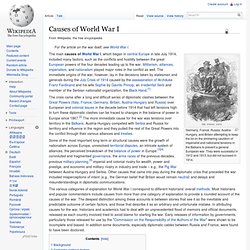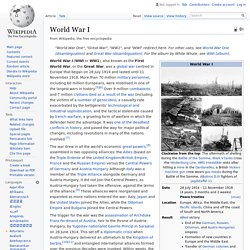

How did Pack Up Your Troubles become the viral hit of WW1? How did Britain let 250,000 underage soldiers fight in WW1? History - British History in depth: Overview: Britain and World War One, 1901 - 1918. Blogs - About the BBC - Introducing iWonder guides for the World War One season. BBC Radio - World War One At Home. BBC History - World War One Centenary - WW1 1914-1918. Media Centre - BBC launches World War One iWonder guides. BBC History - World War One Centenary - WW1 1914-1918. Old Front Line - WW1 Battlefields by Paul Reed. The National Archives. Timeline. First World War.com - A Multimedia History of World War One. Causes of World War I. Germany, France, Russia, Austria-Hungary, and Britain attempting to keep the lid on the simmering cauldron of imperialist and nationalist tensions in the Balkans to prevent a general European war.

They were successful in 1912 and 1913, but did not succeed in 1914. The crisis came after a long and difficult series of diplomatic clashes between the Great Powers (Italy, France, Germany, Britain, Austria-Hungary and Russia) over European and colonial issues in the decade before 1914 that had left tensions high. In turn these diplomatic clashes can be traced to changes in the balance of power in Europe since 1867.[2] The more immediate cause for the war was tensions over territory in the Balkans. World War I. World War I (WWI or WW1), also known as the First World War, or the Great War, was a global war centred in Europe that began on 28 July 1914 and lasted until 11 November 1918.

More than 70 million military personnel, including 60 million Europeans, were mobilised in one of the largest wars in history. Over 9 million combatants and 7 million civilians died as a result of the war (including the victims of a number of genocides), a casualty rate exacerbated by the belligerents' technological and industrial sophistication, and the tactical stalemate caused by trench warfare, a grueling form of warfare in which the defender held the advantage.